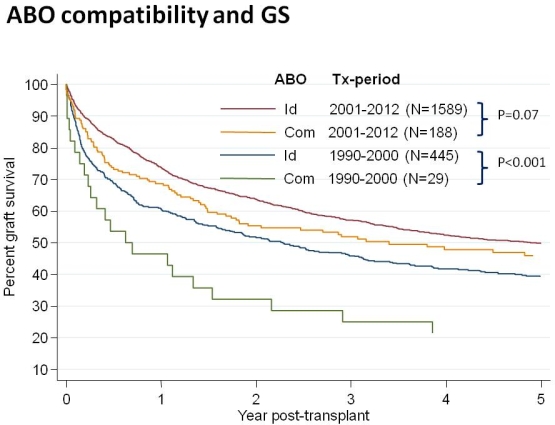The Effect of Compatibility of ABO Blood Type Antigens on Graft Survival of Intestinal Transplants
1Terasaki Foundation Lab, Los Angeles
2Lincoln High School, Stockton
3The 4th Military Medical University, Xi-An, China.
Meeting: 2015 American Transplant Congress
Abstract number: A283
Keywords: Alloantigens, Graft survival, Immunosuppression, Rejection
Session Information
Session Name: Poster Session A: Small Bowel All Topics
Session Type: Poster Session
Date: Saturday, May 2, 2015
Session Time: 5:30pm-7:30pm
 Presentation Time: 5:30pm-7:30pm
Presentation Time: 5:30pm-7:30pm
Location: Exhibit Hall E
Due to the introduction of new immunosuppressive agents and development of pre- and post-transplant patient management, ABO blood group incompatibility is no longer considered an absolute contraindication for kidney transplantation. However, ABO incompatible (ABOi) transplants are still seldom performed in intestine transplantation. According to OPTN database, only 4 ABOi intestinal tx were performed in the US. 6-10% of intestinal transplant recipients received ABO compatible (ABOc) transplants, while most of others received ABO identical (ABOid) transplants. It is not clear whether ABOc transplants have a similar survival rate as compared to ABOid transplants.
Methods; OPTN/SRTR intestine transplant registry data were used for systemic comparison of the effects of ABOc and ABOid transplants on graft outcome. Transplant years were divided into two periods (1990-2000 vs 2001-2012) based on the shift of major induction and maintenance immunosuppressants.
Results: During 1990-2000, 94%(n=445) of patients received ABOid intestinal transplants, while 6% (n=29) received ABOc transplants. ABOid transplant recipients had a significantly higher 5yr graft survival rate than ABOc recipients (39% vs 21%, p<0.0001). In recent years (2001-2012), more patients received ABOc (188, 11%) than early decade (p<0.01). Acute rejection rate before discharge was significantly higher in ABOc recipients than ABOid patients (89%vs81%, p<0.01). 5 yr graft survival rates of ABOc transplant was lower than ABOid transplants. However, the difference did not reach statistical significance (46% vs 49%, p=0.07). The effect of ABO compatibility on graft outcome was further confirmed by Cox Analysis.
Conclusion: ABO compatible intestinal transplants used to have a significantly lower graft survival rate than ABO identical transplants. However, the graft survival difference between these two groups became less significant in recent years, possibly due to the the introduction of new immunosuppressive agents which reduced the risk of transplant rejection.
To cite this abstract in AMA style:
Cai J, Qing A, Wu G, Everly M, Terasaki P. The Effect of Compatibility of ABO Blood Type Antigens on Graft Survival of Intestinal Transplants [abstract]. Am J Transplant. 2015; 15 (suppl 3). https://atcmeetingabstracts.com/abstract/the-effect-of-compatibility-of-abo-blood-type-antigens-on-graft-survival-of-intestinal-transplants/. Accessed February 15, 2026.« Back to 2015 American Transplant Congress
